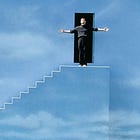Saying less
The power of keeping things to yourself, and the volume of silence
There’s a growing tendency to say too much.
Telling people everything we think—about our ideas, plans, actions, goals, views, and feelings—is what’s been normalized.
And there’s good in that. But we’re in an oversharing culture, one that’s drowned by the hum of everyone fighting to be heard. More and more people are exposing every part of themselves to more and more people who are too busy and inundated with other noise to care.
We’re told to be loud. Social media has trained us we need to use caps, emojis, hashtags, big bold captions, and uniform thumbnails that all look the same now on our videos to get people to listen.
Getting people to listen is exhausting, and it’s usually the quiet ones who say very little anyway that we all want to listen to most.
This post is in many ways a self-critique of what I do wrong and a letter of self-motivation for what I want to do better, and it’s about two very interconnected ideas.
Say less about what you’ll do to protect your focus.
Say less in general to increase your impact
Saying something isn’t the same as doing something
I’ve often found that one of the surest ways to not follow through with something you want to do is to tell people you’re going to do it.
More times than I’d like to admit, I’ve had an idea followed by a strike of passion and motivation, and decided that I want to go do something new. In the honeymoon phase of the idea, like with someone that you’re just starting to date, it’s tempting to want to show it off and tell everyone this one is for real.
But telling people you want to do something, without having done it, sometimes creates an illusion of having done the thing, giving you a false sense of accomplishment. Like you’ve been given a bit of the social reward—the recognition in a way— for doing the thing without needing to have done it.
When you tell people your plans and get their positive feedback, you can lose something in that process that makes following through on the thing less likely. Because saying it out loud to someone can make it feel faux-real.
Saying you will do something is not the same as doing something. And the people who end up getting the most done and have the most follow through tend not to overshare their plans too soon.
I know someone who said they were going to start a podcast. And I know someone else who did start a podcast.
I know someone who said they were going to lose weight. And I know someone else who did lose weight.
I know someone who said they were going to start a business. And I know someone else who did start a business.
I know someone who said they were going to run a marathon. And I know someone who did run an Iron Man.
And trust me, I’ve been the person who said they were going to do something and the person who did do something many times myself. And they usually were not for the same thing.
Because when you keep things to yourself and just go do what is necessary to get it done, you maintain much more focus and you only stand to gain, because:
If you don’t end up doing it, nobody knows…
If you do end up doing it, people will only know through the proof of it.
Have some mystery. By no means for the sake of creating mystery or trying to be mysterious, but simply for the sake of protecting the things you want to do. Just a little bit.
There’s sanctity in the privacy of your plans.
The title of this post should not be taken fully at it’s face value…definitely talk to people about things in your life. Bottling up is bad. Sharing, honesty, and being vulnerable is good. And there’s still a lot of value in being transparent about plans and getting feedback—it often opens the door for opportunities. But it’s about timing and about who you tell. Telling the right people at the right time about ideas can help bring them to reality.
But not everything needs to be said.
Not all your views and opinions need to be publicized.
Not all thoughts and feeling said.
Not all ideas and plans shared.
Not all actions and achievements promoted.
It’s okay to not telling people anything.
Say less and and do more, because action and change through silence is the loudest statement you can make.
“Well done is better than well said.” — Benjamin Franklin
The quieter ones are the ones who make you think
There’s another layer to all this: practicing quiet in general.
The loudest voices, despite their best effort, rarely make us think. They often repeat what everyone else is saying, or fill the air and feed just to be noticed. But the people we lean into, the ones who command presence without raising their voices, are usually the quiet ones.
Think of Keanu Reeves. If you’ve ever see him in an interview, you rarely hear him talk about what he’s doing next. You rarely even hear him at all in fact. But when you do, people listen. His long pauses, his restraint, his intentionality—all amplify his words, because silence is the backdrop that makes speech meaningful.
Silence in nature is often what takes our breath away the most. Silence in movies is what keeps us locked to the screen. Silence in music is what makes space for the best melodies. Silence in speeches is what holds our attention and makes a pedestal for what must be remembered.
Noise is normalized. Silence is deeply underrated.
We’re so used to people cramming every opportunity for nothing and silence with something and noise, that a person who listens more, posts less, and who doesn’t feel the urge to fill every gap with chatter, stands out. They help create space in whatever the conversation is about. And in that space, people reflect. People think. People find clarity.
I used to think that the way to be understood was to keep talking (or writing) until I made myself clear. That to show I knew my stuff at work and wasn’t an imposter, I’d just prove it by being the one who could say the most on the matter—always having an answer and always answering first. Or that to make new friends, I’d have to be my most extroverted self and fill all the gaps with conversation.
But I’ve learned the opposite is true.
I’m not smart by talking a lot.
I’m not having an impact by speaking louder or trying to be important. The more I say, the more diluted the meaning becomes and the more unsure I actually look.
The smartest people I’ve worked with, in reflection writing this post, are almost always the quiet people who carry a kind of gravity that brings confidence and authority to any meeting. They don’t waste words, they listen and learn while letting others talk, and when they do speak, it lands heavier. Their restraint builds trust, because you know they’re not talking for the sake of it—they’re talking because it matters.
And that’s what I think is worth practicing—what I wrote this to reminder myself to practice more of— not just protecting the infancy of our plans by saying less, but building the muscle where we don’t need to be the loudest in the room to be felt. Where we don’t need words to make us feel comfortable.
Try it:
Hold back from offering your opinion right away.
Let the silence hang a little longer in a conversation; let is breed some curiosity.
Notice how much you hear when you’re not trying to be heard.
When you’re asked a question, create a strategic pause first, and reflect before answering. Less umming and ahing our way through pauses, and more intentionally leaving a few.
Speak a little softer when you do—let people lean in a tad more.
Most of us are uncomfortable with quiet. I am. But leaning into it gives your words and your presence more volume.
“When you talk, you are only repeating what you already know. But if you listen, you may learn something new.” — Dalai Lama
So, instead of speaking up to break through the noise, choose quiet. Let your silence build things worth hearing about—and when you do speak, make it count.
If you enjoyed reading this letter, the best compliment I could receive would be your help increasing its visibility by hitting like, or if you shared it with one person or restacked it.











Love this!
…was literally considering a fully silent week when this hit my inbox…did a day once and it annoyed my bandmates quite a bit…especially when it was my turn to sing…